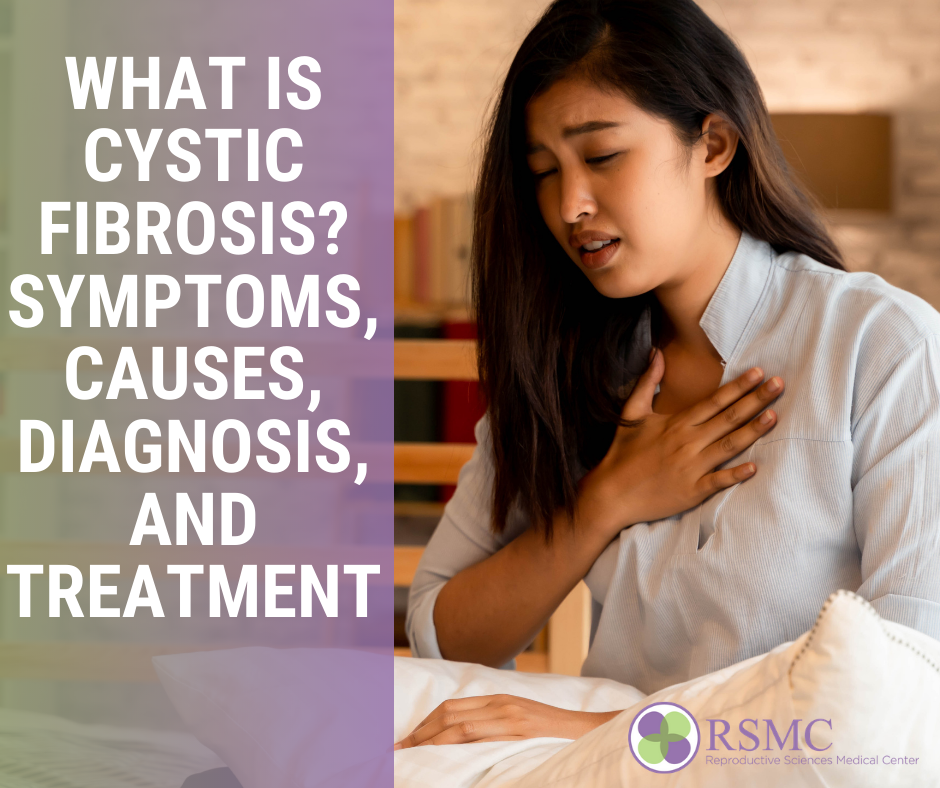Cystic fibrosis or Chronic fibrosis (CF for short) is a debilitating medical condition in which extremely thick mucus accumulates in the body, causing problems with digestion and breathing. It affects over 30,000 people in the United States, more than half of which are aged 18 or older.
Every year, around 1000 new cases of cystic fibrosis are detected in the US, making it one of the most common genetic diseases. In chronic fibrosis, mucus –a protective fluid covering our internal organs – becomes very thick and sticky, clogging the lungs and the digestive system.
When thick mucus builds up in these organs, it can cause big problems with your breathing and food digestion. It can also promote the growth of harmful bacteria, leading to infections.
Although a lot of women with cystic fibrosis can have a healthy pregnancy, it can result in several complications before and during pregnancy.
What causes cystic fibrosis?
Cystic fibrosis is often caused by a mutation in what’s known as the “cystic fibrosis transmembrane conductance regulator” gene (CFTR gene). This is the gene that regulates the movement of salt and water in and out of the cells.
Any unexpected change or mutation in this gene can make your mucus stickier and thicker than normal. This thick mucus accumulates in several body organs, such as the:
- Lungs
- Liver
- Pancreas
- Intestines
It also raises the amount of salt you excrete in your sweat.
There are different defects that can impair the CFTR gene. The severity of cystic fibrosis has been associated with the type of defect. And the defective gene can be transferred from parents to their offspring.
For a child to have cystic fibrosis, they need to inherit a copy of the defective gene from each parent. If the child inherits a single copy of the gene, cystic fibrosis will not develop. However, they are going to be a carrier of the disease, meaning that they can transfer it to their own babies.
Symptoms of cystic fibrosis
In the United States, cystic fibrosis can be detected within the first month of birth during the newborn screening. However, for those born before newborn screening became popular, it may not be detected until the symptoms and signs of the condition emerge.
The symptoms and signs of cystic fibrosis may vary based on the severity of the condition. Even in the same individual, the symptoms can improve or get worse with time. Some people might not even show any signs until adolescence or adulthood. Those who are not diagnosed with CF until adulthood usually have a less severe form of the condition and are at risk of unusual cystic fibrosis symptoms, including infertility, pneumonia, and pancreatitis (inflammation of the pancreas).
People who have cystic fibrosis lose higher amounts of salt in their sweat. Usually, parents can notice the salty taste when they kiss their kids. Many other symptoms of cystic fibrosis affect the digestive and reproductive system.
Respiratory signs and symptoms
The sticky and thick mucus linked with cystic fibrosis may obstruct the tubes that take air in and out of the lung. This may cause symptoms like:
- Wheezing
- Lung infections
- A persistent cough that produces sputum (thick mucus)
- Exercise intolerance
- A runny nose or swollen nasal passages
- Recurrent sinusitis (inflammation of the sinuses)
Digestive signs and symptoms
The thick mucus may also obstruct tubes that take digestive enzymes from the pancreas to the small intestines. In the absence of these enzymes, your intestines will be unable to assimilate nutrients present in your food. This can lead to:
- Poor growth and weight gain
- Intestinal blockage, especially in new babies
- Foul-smelling stools
- Severe or chronic constipation, which can lead to straining while trying to excrete, eventually causing part of the rectum to come out of the anus (rectal prolapse)
When to consult a doctor
If you or your baby is showing symptoms of cystic fibrosis, speak to your physician about getting tested for the condition. See a doctor who is very knowledgeable about cystic fibrosis. It is a serious medical condition that requires consistent follow-up with your physician (at least every three months). Talk to your doctor if you have new or exacerbating symptoms, like weight loss, fatigue, severe constipation, more mucus than usual, or the color of the mucus changes.
Get immediate medical care if you experience chest pain, stomach pain, or if you are coughing up blood or finding it difficult to breathe.
Risk factors
Since cystic fibrosis is a heritable disorder, it can affect many members of a family. Hence, family history is an important risk factor. While all races can have cystic fibrosis, it mostly occurs in white people of Northern European origin.
Complications
Complications from cystic fibrosis can have negative effects on the digestive, respiratory, and reproductive systems and many other organs of the body.
Respiratory system complications
Damaged airways (or bronchiectasis)
Cystic fibrosis is a leading cause of bronchiectasis – a long-term lung condition that causes scarring and widening of the bronchial tubes. This makes breathing and removing thick mucus in the airways more difficult.
Chronic infections
Thick mucus in the sinuses and lungs is a perfect environment for bacterial and fungal growth. Pneumonia, bronchitis, and sinus infections are very common in people with cystic fibrosis. Those with the condition may also have a bacterial infection that is difficult to treat with antibiotics.
Soft, painless growths in the nose (nasal polyps)
Since cystic fibrosis causes inflammation of the nose’s lining, it may lead to the formation of fleshy growths in the nose (polyps).
Airway bleeding (hemoptysis)
Bronchiectasis may occur near the blood vessels in the lungs. The airway damage and infection can lead to coughing up blood. Although this is just a tiny amount of blood, it can be fatal.
Pneumothorax
This occurs when air leaks into the pleural cavity between the lungs and chest wall, causing part of or the entire lung to collapse. Pneumothorax is more common in people with cystic fibrosis. It may result in sudden chest pain and breathlessness. Patients often report feeling a bubbling sensation in their chest.
Respiratory failure
Cystic fibrosis may cause severe damage to lung tissue, stopping it from functioning. Lung function often gets worse with time, and it can even lead to death. Respiratory failure is one of the major causes of death in the United States.
Acute exacerbations
People suffering from cystic fibrosis may experience a sudden worsening of their respiratory symptoms, like shortness of breath and coughing with more thick mucus. This is known as an acute exacerbation and is treated with antibiotics. Although the patient can be treated at home, hospitalization may be required. Weight loss and fatigue also occur during acute exacerbations.
Digestive system complications
Nutritional deficiencies
Mucus may obstruct the tubes that take digestive enzymes from the pancreas to the intestines. In the absence of these enzymes, the body will be unable to absorb fats, protein, and certain vitamins, so you cannot receive enough nutrients from food. This may lead to weight loss, delayed growth, and pancreatitis (inflammation of the pancreas).
Diabetes
The pancreas secretes insulin, an important hormone that the body needs to utilize sugar. Since cystic fibrosis blocks the pancreas, it may raise the risk of having diabetes. Approximately 20% of adolescents and 40-50% of adults with cystic fibrosis have diabetes.
Liver disease
Cystic fibrosis may also cause inflammation and blockage of the tubes that transport bile from the gallbladder and liver to the small intestine. This can result in several liver problems, including jaundice, cirrhosis, fatty liver disease, and even gallstones.
Distal intestinal obstruction syndrome (DIOS)
This is a complete or partial blockage of where the small and the large intestines meet. It requires immediate medical treatment.
Intestinal obstruction
People with cystic fibrosis can have intestinal blockage. A condition known as intussusception can also occur. In this condition, a part of the intestine invaginates into the adjacent section of the intestine.
Cystic Fibrosis and Infertility
Infertility in men
Nearly all men with cystic fibrosis experience infertility issues since the tubes that link the testes and the prostate gland are either obstructed with mucus or completely missing. Fortunately, there are certain surgical procedures and fertility treatments that can help men with cystic fibrosis have their own biological children.
Decreased fertility in women
While women with cystic fibrosis may not be as fertile as other women, they can still become pregnant and have healthy pregnancies. However, the symptoms and signs of cystic fibrosis may worsen during pregnancy, so make sure to talk to your doctor about the potential risks when trying to become pregnant.
Other possible complications
- Dehydration and electrolyte imbalances. Since people with cystic fibrosis lose more salt in their sweat, the balance of electrolytes in their bodies may be affected. This can make them more likely to be dehydrated, especially in hot weather or during exercise. Symptoms of dehydration and electrolyte imbalances are low blood pressure, fatigue, lethargy, and increased heart rate.
- Osteoporosis (thinning of the bones): People suffering from cystic fibrosis may also be more likely to experience thinning of their bones. They can also have arthritis, muscle pain, and joint pain.
- Mental health issues. Dealing with an incurable chronic condition can cause anxiety, fear, and depression.
Cystic fibrosis diagnosis
There are 3 different types of screening for detecting cystic fibrosis: (I) carrier testing, (II) newborn screening, (III) and antenatal testing. Since newborn screening is now done for all children born in the US, diagnosis of cystic fibrosis in adulthood is becoming rare.
Treatment for cystic fibrosis
The type and severity of the symptoms may vary from one person to the other. For this reason, the cystic fibrosis treatment plans are usually customized to each patient’s unique circumstances (although there may be some similar elements).
People with cystic fibrosis and their families know how this condition affects them and their quality of life. By playing their specific roles, patients and their families can work together with medical care teams to design treatment plans that suit their life and health goals.
There are over 130 care centers accredited by the CF Foundation. These clinics are staffed by committed healthcare experts who offer professional medical care and customized disease management for people with cystic fibrosis.
Every day, CF patients undergo a combination of these therapies:
- Airway clearance to help remove the thick mucus that may accumulate in the lungs.
- Inhale drugs to unclog the airways or make mucus thinner. These liquid medicines are made into an aerosol or mist, which is inhaled using a nebulizer. They contain antibiotics to combat lung infections and therapies to keep the airways open.
- Pancreatic enzyme supplements to raise the absorption of important nutrients. These supplements are available in a capsule form and are ingested with every meal. CF patients may also take multivitamins.
- A customized fitness plan to enhance lung function, energy level, and general health.
- CFTR modulators that specifically target the defect in the CFTR protein. Since different mutations bring about different defects in this protein, the drugs that have been produced so far only work in patients with certain mutations.
Preventing cystic fibrosis
Although cystic fibrosis can not be prevented after a baby is born, genetic screenings such as PGS and PGD can be performed for parents who have cystic fibrosis, are carriers or who have relatives suffering from this disease. PGD is most prevalent in screening out embryos with mutated or misaligned CFTR genes. However, this can only be done in IVF pregnancy.
Conclusion
While Cystic Fibrosis is a serious condition that necessitates daily care, there are a number of treatments available, and those treatments have greatly improved over time. People with Cystic Fibrosis may experience pregnancy complications and should consult fertility experts for viable solutions.
Reproductive Sciences Medical Center offers consultation with renowned fertility specialists and infertility treatment options (including IVF with PGD) for all hopeful parents. feel free to get in touch.























